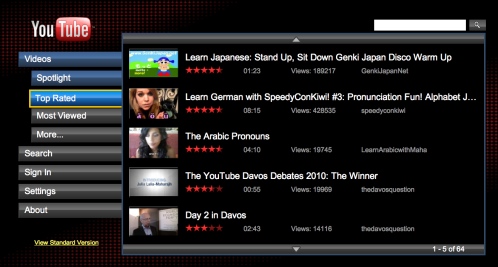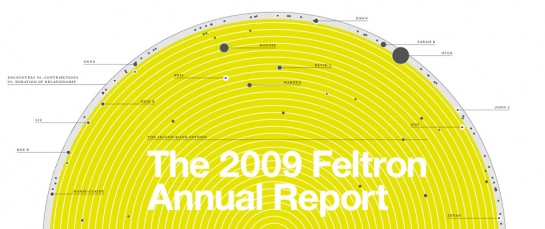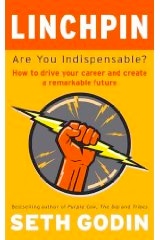Things I learned this week – #5
Image CC BY-NC mikeabney
Top 3
- I thought that I kept myself fairly anonymous online to all but the people I want to interact with. Turns out I was wrong. Check out Panopticlick to start being worried about ‘browser fingerprinting’.
- Vooks look either cool or completely pointless, depending on your point-of-view and mood. (via @betchaboy)
- Dunbar’s Number is the theoretical maximum number of stable relationships an individual can sustain. It turns out that it’s about 150, which makes some people’s Twitter and Facebook profiles look ridiculous!
Tech.
- After some pressure from @mwclarkson, Prezi have announced their Edu Pro and Edu Enjoy licenses for use in the classroom. Now students can abuse Web 2.0 in the same way that they abuse Powerpoint… 😉
- Need to create an iPhone app quickly and easily? Try http://isites.us!
- Google Docs now has thumbnail previews. The world rejoiced (although it doesn’t make my thesis look very pretty)
- Paul Stamatiou re-affirmed his geek credentials by pimping out his Macbook Pro with a RAID 0 array. I’m tempted, but not really ready to sacrifice my DVD-RW drive yet! 😮
- The Apple iPad was never going to live up to the hype. Here are 10 things allegedly ‘missing’ from it.
- Engadget has a handy post for geeks: iPad – the definitive guide so far (via @chrispenny)
- It would be remiss of me not to embed the following YouTube video: Hitler debunks the iPad
[youtube=http://www.youtube.com/watch?v=lQnT0zp8Ya4&w=425&h=344]
- Apparently the iPad is ‘iBad’ for freedom according to the Free Software Foundation. They’ve got a point. But I’ll still be getting one. 😉
- Stephen Fry weighed in, along with seemingly the rest of the world, with his views on what the iPad means for mankind.
- Thankfully, the iPad supports the ePub format for ebooks. You can find lots of these at epubbooks.com (via @chrispenny)
- The Polarize iPhone app allows you to create photos that look that they’ve been taken with a Polaroid camera. Cool! (example here)
- Screensplitr for the (jailbroken) iPhone allows you to output any app to another screen (via @wesfryer)
- I found this 360-degree video of Haiti unbelievable. It uses the same YellowBird camera that Google uses for ‘Street View’ (via OLDaily) I was going to embed it here, but it auto-plays, which is annoying…
- You can now upload email into a Google Apps email account using an (official) OSX app. This might be a good time for me to switch to an @dougbelshaw.com email address… 🙂
- That button in Tweetie that I’ve never pressed (see below – looks like a business card)? Turns out it adds contact details from someone’s contact details from Twitter to your iPhone address book. Sweet!

- Air Show is a free iPhone app that lets you stream your camera roll over wifi to any UPnP-enabled device (e.g. Xbox 360, PS3)
- Need a non-linear video editor (like iMovie or Windows Movie Maker) for Linux? Try OpenShot!
- These, apparently, are the 9 most important events in Open Source history (via @sc_r)
- Is the fact that only 20% of Twitter accounts are active ‘shocking’? I can think of more things that shock me. Quite a lot. Most things, in fact. ;-):
- Turns out that UK iTunes customers get a better deal than their US counterparts. But less cool stuff, unfortunately.
- The Apple SDK now allows VOIP over 3G. Hello Skype! (via @burntsugar)

- Flickrriver is an easy, enjoyable and intuitive way to view Flickr photos (via @betchaboy)
- You can now get Google Voice on the iPhone thanks to HTML 5 (but when is it coming to the UK?!)
- You can get Google Toolbar’s features without installing it, for those who are concerned about privacy.
- Sikuli is a free (and easy) way to automate stuff for free on Mac/Linux/Windows.
- Looks like Mozilla Weave is living up to its promise as it reaches v1.0. It syncs everything!
- Looking for a game to play on various platforms? BoingBoing‘s got you covered
- Create Nintendo Mii-like avatar (via @tombarrett)
Productivity & Inspiration

- Lifehacker has 10 tips for better reading online and offline (definitely check out Stanza and Instapaper if you haven’t already!)
- Some things give you energy, some things drain it. These are the 10 worst energy-zappers, apparently.
- In a wonderful and timely post, Chris Guillebeau makes the simple yet extremely effective point that What you don’t do doesn’t matter
- I found the idea of ‘firing’ your community every so often fascinating. I’ve unfollowed everyone on Twitter and unsubscribed from all blogs before and started again. Perhaps time to do so a second time?
- ‘Hustle’ when you want to learn new things. I think we in the UK would call this ‘blagging’.
- Some ways to make your work environment more creative.
- I always work to music or ambient noise. RainyMood is now another tool in my toolkit. 🙂
- Always rushing around? It’s not good for you! Try How not to hurry
Education & Academic

- I was shocked to discover that some UK Local Authorities are going to pay £10,000 on a filter to remove comments from being displayed when students visit YouTube. Kerry Turner (@4goggas) who gave the heads-up also pointed out youtube.com/xl which I hadn’t used before. Handy!
- JISC published their final report into ebooks as (appropriately) a rather nice issuu document. Worth looking at the Executive Summary if nothing else!
- Not having actually used one doesn’t stop some people ruminating on how the iPad will change education. Inevitable.: (via @baldy7)
- Futurelab has a really well put-together video about the future of education using the research from Beyond Current Horizons (from Beyond Current Horizons research) Apparently, half the population of Europe will be 50 by 2030 and will expect to live another 40 years (I’ll be 50 in December 2030 – scary!)
- Leigh Blackall wrote an interesting post on How to produce, publish and distribute a textbook these days
- I knew about the Open Educational Resource stuff but didn’t, strangely, know about OERcommons – nice search engine! (via @betchaboy)
- Lisa Nielsen (aka The Innovative Educator) has a great post on allowing kids to grow ‘digital wings’. I agree!
- This is a handy visualization to show how everyone from senior leaders to students can use internet technologies (via @BFChirpy)
- Scott Leslie, one of the advisors for the 2010 Horizon Report, recorded some video interviews with some people who created the report (via OLDaily)
Data, Design & Infographics
 Dan Meyer threatened us all with driving round to our houses to force us to watch this excellent video called Vanishing Point. No need – it’s great!
Dan Meyer threatened us all with driving round to our houses to force us to watch this excellent video called Vanishing Point. No need – it’s great!- I bought Autograph for $6 this week (OSX only). It allows you to draw, in a simple way, using your Macbook trackpad – ace!
- Turns out the type of font you use determines how hard you perceive something to be. There’s a reason I use Georgia in everything I do – I read years ago (when I was at uni) that it has a positive effect, psychologically-speaking… 😀
- This chart shows the number of mobile subscribers, per 100 people, worldwide.
- I saw this first time around but didn’t blog it. Some designers showed how much ink different fonts use by colouring in words with biros. If you’re concerned about the amount of ink you use, try Ecofont!
- I’m rather pleased with the sparkline (mini-graph) I added to the footer of this blog. There’s a kind-of howto here, but I’ll be screencasting how to do this next week. In the course of doing this I was reminded about the Google Charts API. Lots of services provide a front-end for Google Charts, but this tool in particular makes it very quick and easy to make stunning charts!
- There’s a guy who records everything he does. He creates wonderful and interesting visualizations in his annual report. Check it out! (try Daytum or your.flowingdata.com if you’re crazy enough to do likewise!)

- When you think about it, obviously Hubble telescope photographs are false-colour. Here’s how they do it. (via kottke.org)
- Here’s a visual representation of aid to Haiti
Misc.
- Boyce Avenue became famous doing covers of famous songs on YouTube. They’ve now signed a record deal. I’m not sure that’s a good idea, for some reason.
- Men can’t put their trousers around their waist beyond the age of 39. Kill me at 38 if I’m going to end up doing this. Please. (via @jenny_wood via @mickgwyther)
- Simple election posters may be effective on one leve, but then it allws people to create online generators to mock you:


- There are 3 phases of owning a computer. Not if you buy a Mac there aren’t…(via @dougpete)
- Wow! I’ve got to drive some of these roads before I die! (via @glassbeed)
- Small-breasted pornstar? No work for you in Australia.
- Why write a book in 2010? Seth Godin’s got some good reasons.
- Apparently, just thinking about time makes your body sway – forwards if you’re thinking about the future, backwards if you’re thinking about the past. That’s worth an experiment Chez Belshaw, methinks… 😉
- The US Navy reckon that video games improve ‘fluid intelligence’ (via @Quinnovator)
- Snowpeople. How cute and bizarre:

- Did Mallory and Irvine beat Hillary and Norgay to the summit of Everest?
- It’s all about the [attention] economy, stupid! (via @hrheingold)
- The average Kenyan spends over 50% of their disposable income on mobile communication (via @josiefraser … via @steiny)
- Haiti’s had a troubled history – and not just because of natural disasters (via @johndavitt via @worldhum)
- I’m definitely going to be reading Houdini’s The Right Way to do Wrong: an exposé of successful criminals courtesy of Google Books! (via BoingBoing)
Quotations
Misfortune shows those who are not really friends. (Aristotle)
If change doesn’t cost you anything then it isn’t real change. (John C. Maxwell)
Success consists of going from failure to failure without loss of enthusiasm. (Winston Churchill)
Stress is an ignorant state. It believes that everything is an emergency. Nothing is that important. (Natalie Goldberg)
The quality of our thoughts is bordered on all sides by our facility with language. (J. Michael Straczynski)


![Reblog this post [with Zemanta]](http://img.zemanta.com/reblog_e.png?x-id=825f0f2f-79b2-459e-a8d5-29be2d9c330a)



 The warm-up guy for Dan was
The warm-up guy for Dan was  I made quite a few notes on Dan Pink’s talk. I love the way he signposted, as all good teachers and presenters do, not only what he was going to talk about but also how he was going to deliver it. A good presentation, he believes, consists of:
I made quite a few notes on Dan Pink’s talk. I love the way he signposted, as all good teachers and presenters do, not only what he was going to talk about but also how he was going to deliver it. A good presentation, he believes, consists of: